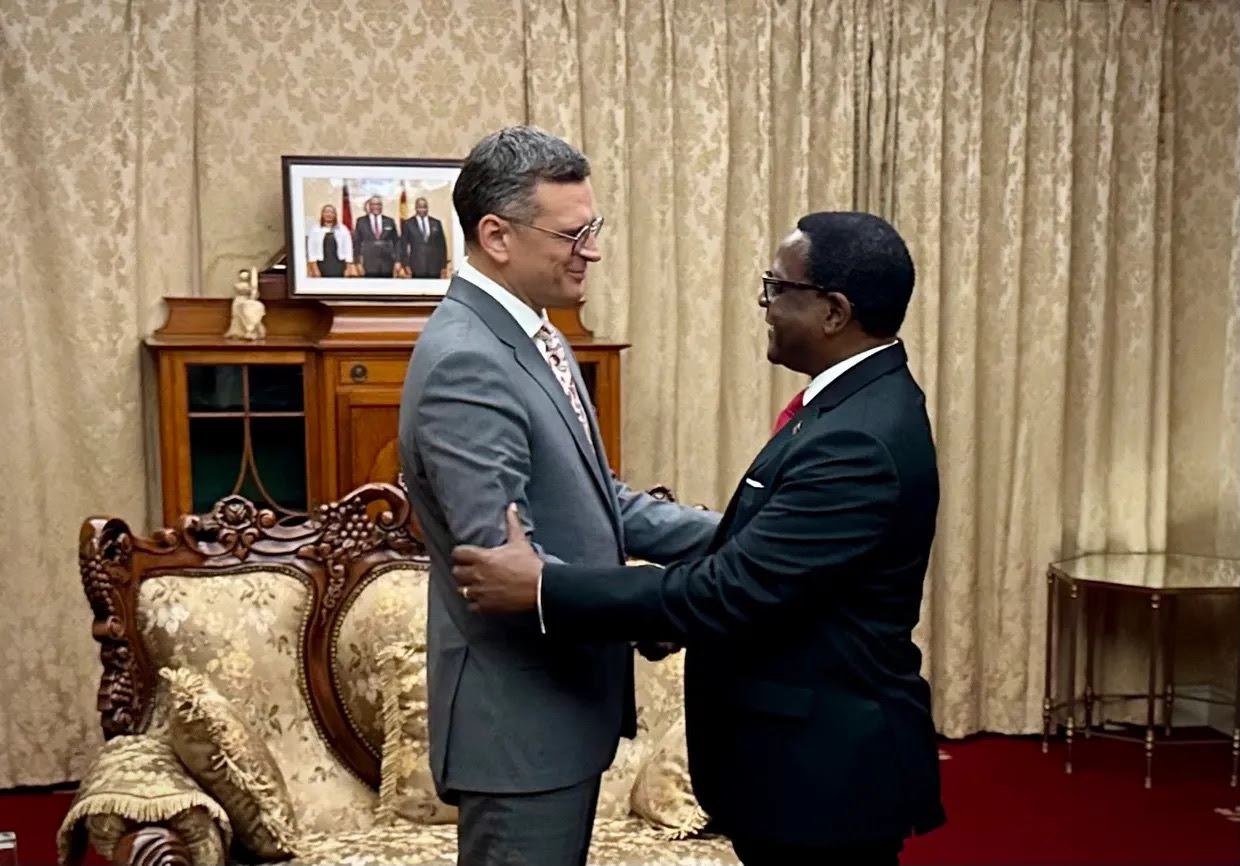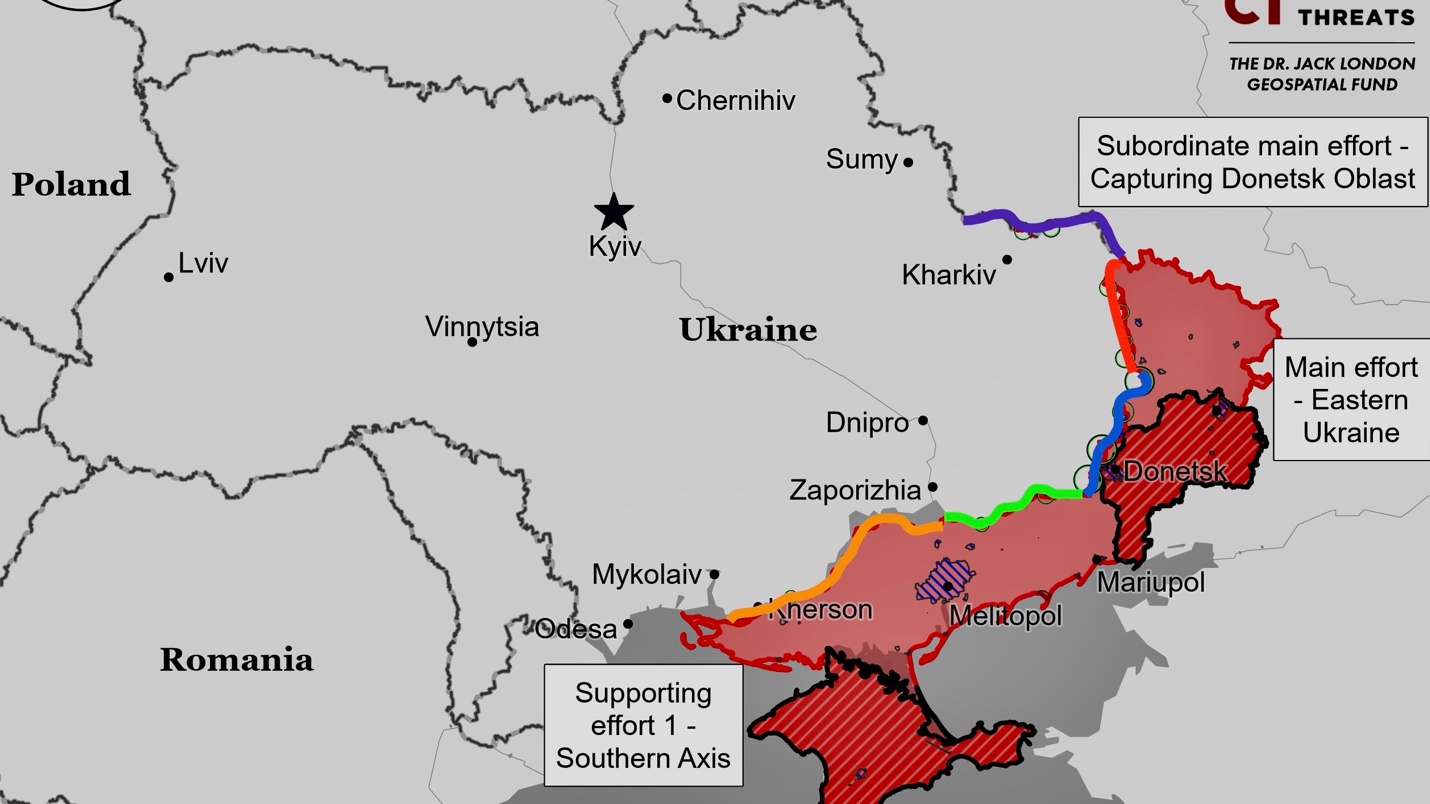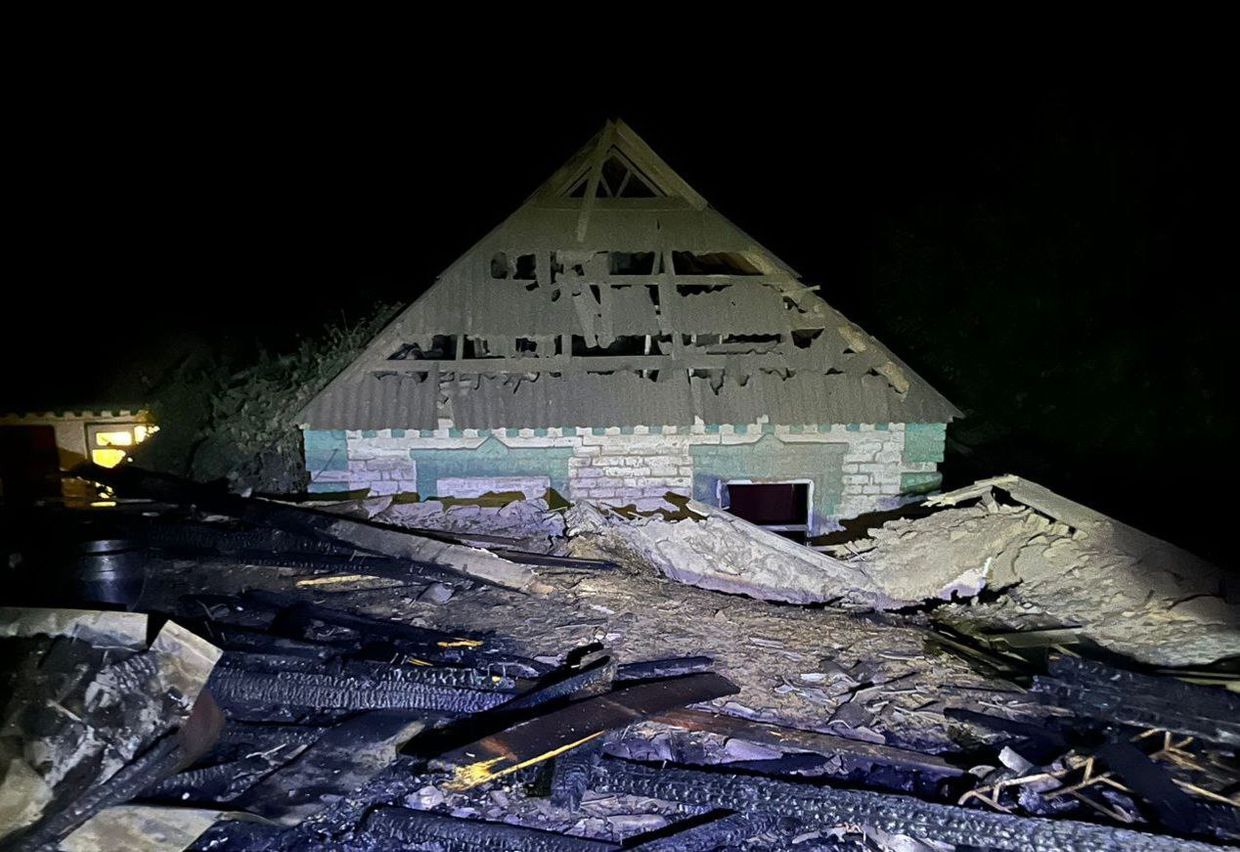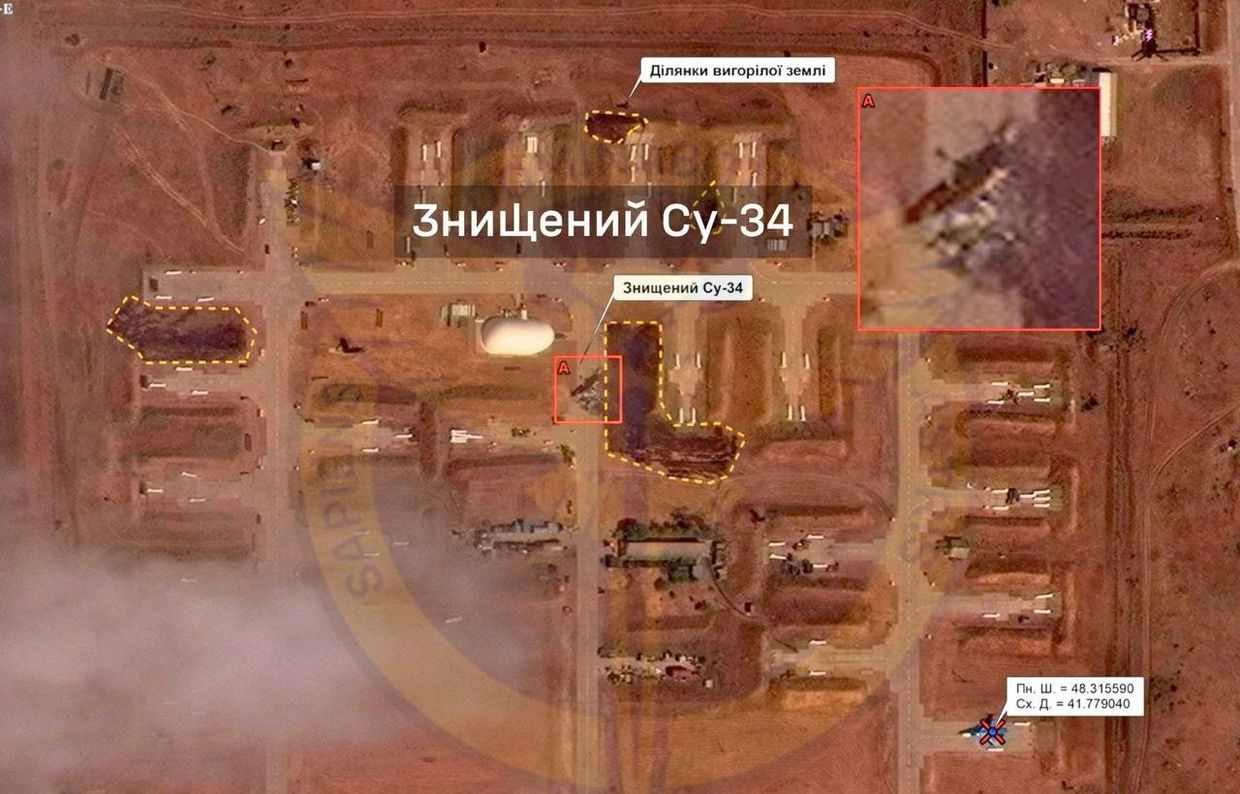Summary of the day: Russian authorities detained Vyacheslav Akhmedov, the head of the Russian Ministry of Defense’s (MoD) Patriot Park, and Major General Vladimir Shesterov, the Deputy Head of the MoD’s Directorate for Innovative Development, on charges of large-scale fraud. Additionally, insider sources suggest that Lieutenant General Alexander Shestakov, Head of the MoD’s Main Armored Directorate, may soon leave his position. On the same day, Russian Security Council Secretary Sergei Shoigu discussed cooperation with top Iranian officials in Tehran. Meanwhile, Russia is enhancing entry requirements for Tajik migrants, likely in response to security concerns from the Islamic State’s Afghan branch, IS-Khorasan (IS-K)’s activities. In military developments, Ukrainian forces achieved significant strikes, destroying Russian military assets at Morozovsk Airfield, and Russian troops made advances in areas east of Toretsk, Pokrovsk, near Donetsk City, and Robotyne.
Picture of the day:
 Ukraine’s Foreign Minister Dmytro Kuleba and Malawi’s President Lazarus Chakwera. (Dmytro Kuleba/X)
Ukraine’s Foreign Minister Dmytro Kuleba and Malawi’s President Lazarus Chakwera. (Dmytro Kuleba/X)
What Can I Do To Help Ukraine? This is a question I receive all the time. We at Transform Ukraine are building longer-term housing for internally displaced Ukrainians. Visit Rebuild Ukraine for how you can assist in housing a Ukrainian family displaced by the war.
Beyond Ukraine – The March Towards World War
Russian Security Council Secretary Sergei Shoigu met with high-ranking Iranian officials in Tehran, emphasizing Russia’s readiness for extensive cooperation with Iran in regional affairs. This meeting, following a May invitation from Iran’s National Security Council Secretary Ali Akbar Ahmadian, occurred amid rising tensions due to the planned Iranian retaliatory strike against Israel. Discussions included bolstering political, economic, and defense ties, with both nations condemning the killing of Ismail Haniyeh, former head of Hamas, and rejecting the escalation of regional conflicts. These talks are critical as they also affect Russian military operations in Syria, where Russia has significant deployments.
Colonel Mikhail Matrosov announced that the Belarusian Air Force and Air Defense Forces will join military exercises at the Ashuluk training ground in Astrakhan Oblast, Russia.
Kremlin officials have responded to right-wing anti-immigration riots in the UK by criticizing the British government’s handling of the protests, alleging hypocrisy and inadequate response. Russian Foreign Ministry spokesperson Maria Zakharova accused the UK of using excessive force against protesters while condemning Russia’s own protest crackdowns. Russian media have portrayed the UK protesters sympathetically, suggesting UK authorities favor “violent migrants” and linking the situation to wider claims of “Islamization” in Western countries. Russian coverage has included inflammatory descriptions and calls for stricter migration controls in Russia, reflecting a broader use of xenophobic and Islamophobic rhetoric by Russian officials and media.
Russian media and officials are alleging that the West, particularly the US, is attempting to exclude Russian athletes from international sports, including the ongoing Summer Olympics. The Russian Foreign Intelligence Service asserts that the US is targeting Russian participation in synchronized swimming, figure skating, and rhythmic gymnastics. These allegations involve collaboration with Grigory Rodchenkov and Timofey Sobolevsky, former heads of Russia’s anti-doping laboratory, who exposed Russia’s doping scandal and are now in hiding. Additionally, Russian law enforcement has recently added Rodchenkov and Sobolevsky to a wanted list for allegedly tampering with a Russian athlete database.
A group of 69 European parliamentarians urged the EU to take “urgent measures” against Hungary for easing visa rules for Russian and Belarusian citizens. Hungary’s July decision allows these “guest workers” streamlined visa access without enhanced security checks. Led by Lithuania’s Petras Austrevicius and Czechia’s Danuse Nerudova, the MEPs warned this poses a significant security threat and suggested questioning Hungary’s Schengen membership. The streamlined visa rules could enhance Russian espionage within the EU, they said. The European Commission has asked Hungary to explain its decision and promised action if security risks are confirmed. Hungary has previously obstructed EU sanctions against Russia and has deepened economic ties with Moscow during the war in Ukraine.
Hungary will not face oil shortages despite Ukraine blocking Lukoil’s crude transit, according to MOL Group CEO Zsolt Hernadi. He assured that Hungary has 90 days of reserves and can purchase Russian crude via Croatia. This contradicts concerns from Prime Minister Viktor Orban’s government and Slovakia, which sought EU help. The EU stated that Ukraine’s sanctions on Lukoil won’t impact the Druzhba pipeline. EU diplomats are frustrated with Hungary and Slovakia for not reducing their dependency on Russian oil, unlike other member states.
Situation On The Land, Sea, and Air in Ukraine

Kharkiv Front – Initiative Russia
Fighting persisted in northern Kharkiv Oblast without any changes to the frontline. Clashes occurred north of Kharkiv City near Hlyboke and Lyptsi, and northeast in Vovchansk and Tykhe.
Luhansk Front – Initiative Russia
Russian forces continued ground assaults along the Kupyansk-Svatove-Kreminna line without any confirmed territorial gains. Reports from a Russian military blogger claimed capture of Ukrainian positions southeast of Kupyansk, but these have not been visually confirmed. Combat persisted in several areas, including east and southeast of Kupyansk, as well as northwest and southwest of Kreminna, without significant changes to frontlines.
Donetsk Front – Initiative Russia
Siversk
Russian forces conducted limited offensive operations in the Siversk area without achieving any confirmed advances. Claims by a Russian military blogger of a 1.5-kilometer advance north of Rozdolivka were not corroborated. The Ukrainian General Staff noted unsuccessful Russian attacks east, southeast, and south of Siversk.
Chasiv Yar
Russian forces conducted offensive operations near Chasiv Yar without achieving any territorial gains. Russian sources mentioned improvements in their positions around the eastern part of Chasiv Yar and along the Siverskyi-Donets Donbas Canal. However, the Ukrainian General Staff reported unsuccessful Russian attacks in several areas around Chasiv Yar, including east, southeast, and south of the town.
Toretsk
Russian forces have made notable tactical gains in the Toretsk area, advancing to central positions in Druzhba and Pivnichne as confirmed by recent geolocated footage. They have reached key streets in both towns and are attempting maneuvers near Zalizne and the Tsentralna electric substation. Additionally, efforts are underway to bypass the Phenol plant in Niu York.
Pokrovsk
Russian forces continued to advance east of Pokrovsk, reportedly nearing the completion of a tactical encirclement of Ukrainian forces near the T-0511 road southeast of Pokrovsk. Russian sources claim to have encircled three Ukrainian brigades near Zhelanne, with additional advances in surrounding fields. Despite some claims of Russian forces entering Zhelanne, there is no visual confirmation yet. The Ukrainian General Staff reported ongoing clashes in multiple areas around Pokrovsk, including near Kalynove, Vozdvyzhenka, and Karlivka, where elements of the 1st Donetsk People’s Republic Army Corps are active.
Southwest of Donetsk City
Russian forces made limited progress west and southwest of Donetsk City. Geolocated footage showed Russian troops advancing west along Sedova Street in northwestern Krasnohorivka and north along Chkalova Street in southeastern Kostyantynivka. Significant Russian military assets are actively engaged in the Kurakhove area. Notably, Russian forces have conducted mechanized assaults near Marinka-Maksymilyanivka, while other Russian forces have made advances, including severing the Vuhledar-Kostyantynivka highway on August 2.
Zaporizhia Front – Initiative Russia
Zaporizhia-Donetsk Border Area
A Russian military blogger claimed that Russian forces advanced south of Urozhaine near the Donetsk-Zaporizhia Oblast border. However, this claim has not been visually confirmed.
Zaporizhia Line
Russian forces achieved a slight advance northeast of Robotyne in western Zaporizhia Oblast, continuing their ground attacks in the area. Earlier geolocated footage from July 26 showed a minor advance, though it appears not to be recent. Additional ground assaults occurred near Robotyne, Mala Tokmachka, and Novodanylivka.
Kherson (Dnipro River) Front – Initiative Russia
Russian forces carried out ground assaults on the east bank of Kherson Oblast and the Dnipro River Delta islands, with no confirmed changes to the frontline.
Ukraine News
Russian forces launched 24 Shahed-136/131 drones from locations in Krasnodar Krai and Kursk Oblast, targeting various regions in Ukraine, including Kyiv and Vinnytsia. All drones were intercepted and downed by Ukrainian forces, with debris landing harmlessly in open areas. Additionally, Russian forces fired a missile from occupied Kherson Oblast at Mykolaiv Oblast. There were also reports of a Russian Iskander-M ballistic missile strike against Balakliya in Kharkiv Oblast, though this has not been independently confirmed.
Mali has not provided evidence of Ukraine’s ties to Tuareg rebels, Ukraine’s Foreign Ministry said. The ministry called Mali’s decision to sever diplomatic relations “regrettable” and stated that no proof of Ukraine’s involvement in the alleged incident between Wagner mercenaries and Tuareg rebels has been presented.
Ukraine’s military intelligence chief, Kyrylo Budanov, stated on August 3 that neither Ukraine nor Russia could completely destroy each other’s energy systems, citing strong protections dating back to Soviet times. Despite extensive aerial attacks on Ukraine’s energy infrastructure by Russia, causing significant deficits and rolling blackouts, complete destruction is deemed almost impossible. Ukraine has targeted the Russian oil industry to impact its war funding, affecting up to 14% of Russia’s oil refining capacity. Meanwhile, Russia has bolstered its air defense capabilities. Minimal power outages are expected in Ukraine over the next three months unless new attacks occur, even as a recent heatwave pushed energy consumption to maximum levels, leading to extensive blackouts.
The Security Service of Ukraine (SBU) reported dismantling a “large-scale” sabotage network orchestrated by Russia’s Federal Security Service across six oblasts, involving two Ukrainian government officials. The network, composed of nine individuals including a Dnipro City Council member and a Yuzhne town official, was accused of surveilling critical infrastructure and military positions to inform Russian handlers. The suspects, arrested simultaneously in Dnipropetrovsk, Sumy, Zaporizhzhia, Kirovohrad, Donetsk, and Odesa, face charges of treason and potential life imprisonment.
Kellyanne Conway, a former senior counselor to ex-President Donald Trump, has registered as a lobbyist for Ukrainian oligarch Victor Pinchuk’s philanthropic foundation. The disclosure, filed with the U.S. Justice Department, states that Conway will work for the foundation’s U.K. office to raise awareness among U.S. lawmakers and experts about Ukraine’s importance and the ongoing conflict with Russia. Her duties include promoting the upcoming Yalta European Strategy conference in Kyiv. Conway will earn $50,000 per month for her work from July to November, with an option to extend.
Ukraine’s Health Ministry reported detecting three cases of the new FLiRT strain of coronavirus in July. The FLiRT strain, a set of subvariants derived from the Omicron variant, was first named in March 2024. Two cases were found in Kyiv and one in Ivano-Frankivsk Oblast, involving two women and a man, all over 60. The ministry stated that current vaccines and boosters are still effective in preventing severe illness from this strain, though they may not fully prevent infection. The FLiRT strain has mutations that make it more dangerous for those with weakened immunity. Since the pandemic began in 2020, Ukraine has recorded over 5.5 million Covid-19 cases and more than 112,000 deaths. Covid-19 restrictions were officially lifted in July 2023.
Ukraine’s birth rate continues to decline in 2024, with one newborn for every three deaths in the first six months of the year, according to Opendatabot on August 5. Data shows 87,655 births and 250,972 deaths during this period, though figures may be incomplete due to Russia’s occupation of some territories. The demographic crisis, worsened by the Covid-19 pandemic and ongoing war, shows Kyiv with the most births (9,695), followed by Lviv (7,923) and Dnipropetrovsk (6,962). The lowest births were in front-line areas like Chernihiv (1,904) and Sumy (1,798). No birth data is available for occupied Crimea and Luhansk. The highest death tolls were in Dnipropetrovsk (26,374), Kharkiv (17,999), and Odesa (16,085). Ukraine’s population has decreased from over 50 million in the early 1990s to over 37 million by January 2024, with projections suggesting it could drop to 15.3 million by 2100 due to high emigration and low birth rates.
Innocent Victims Of War
The casualty count of civilians in the past 24 hours:
DEATHS: 1 INJURIES: 9
- The Nikopol district in Dnipropetrovsk Oblast was heavily attacked by Russian drones and artillery. The town of Pokrov suffered the most damage. A 26-year-old man and a 70-year-old woman were injured. The attacks damaged a cafe, a shop, houses, high-rise buildings, energy infrastructure, and other properties.
- In Donetsk Oblast, a Russian attack on Hrodivka killed one person and injured another. Additionally, one civilian was wounded in Ukrainsk and another in Vesele.
- Russian attacks on Kherson Oblast injured four people in the past day.
 The aftermath of Russian attacks against the Nikopol district in Dnipropetrovsk Oblast overnight. (Governor Serhii Lysak/Telegram)
The aftermath of Russian attacks against the Nikopol district in Dnipropetrovsk Oblast overnight. (Governor Serhii Lysak/Telegram)
Ukrainian Mobilization and Defense Industrial Base
The Ukrainian military is refining its mobilization and recruitment strategies to enhance troop readiness. On August 1, the General Staff announced proposals to simplify the mobilization process, reduce risks for personnel, and allow commanders to directly recruit service members for their units. These changes also permit recruits to select their positions within military units.
British soldiers have been alerted to potential espionage by Russian spies and drones targeting Ukrainian troops trained in the U.K., as reported by The Times. This warning, detailed in a military handbook, highlights increased Russian interest in Operation Interflex, a British-led initiative that has trained around 34,000 Ukrainian recruits. The suspected methods include drone surveillance over military bases and direct approaches to British trainers. Despite concerns, defense sources noted “little evidence” of actual drone spying within the U.K., suggesting the handbook aims to preempt potential risks. This situation echoes similar surveillance issues in Germany, where spy drones have been a persistent concern at military training sites. The training of Ukrainian forces is part of an international effort involving 34 countries, with the EU’s EUMAM mission also planning to train 60,000 troops by summer’s end.
Ukraine is actively enhancing its domestic defense industrial base. On July 30, Defense Minister Rustem Umerov reported that the Ministry of Defense signed two deals with local enterprises worth nearly five billion hryvnias (approximately $121 million). Additional agreements worth over 3.7 billion hryvnias (around $90 million) were confirmed on August 1 for supplying the Ukrainian military with ground-based strike drones.
Ukraine is enhancing its defense capabilities with support from Western partners. On August 2, Ukrainian Defense Minister Umerov and First Lady Olena Zelenska launched the Hetman Ivan Vyhovskyi Ada-class corvette in Istanbul. Umerov confirmed that Ukraine and Turkey have agreed to construct the Hetman Ivan Vyhovskyi and Hetman Ivan Mazepa Ada-class corvettes in Turkey in response to Russia’s invasion.
Ukraine’s Allies
Japanese Justice Minister Ryuji Koizumi arrived in Ukraine to discuss judicial reform and anti-corruption efforts. He met with Ukraine’s Prosecutor General Andrii Kostin and visited the Bucha victims’ memorial and a coordination center for massacre victims. Koizumi also signed a cooperation memorandum with Ukrainian Justice Minister Denys Maliuska. Japan has committed over $12 billion in aid to Ukraine since March 2022 and pledged an additional $4.5 billion for 2024. This visit follows a recent trip by Japan’s Education and Science Minister to discuss cultural and educational cooperation.
President Volodymyr Zelensky announced on August 4 that Kyiv will discuss with NATO the formation of a coalition to help intercept Russian missiles over Ukraine. Russian missiles and drones have occasionally entered Polish and Romanian airspace, prompting these NATO countries to scramble fighter jets, though they have not engaged the targets. Zelensky emphasized the need for neighboring countries’ combat aircraft to counter Russian missiles threatening Ukraine and its neighbors. He acknowledged the difficulty of this responsibility for NATO partners and has tasked diplomats to organize a NATO-Ukraine Council meeting to explore the idea. While Poland is considering the proposal, other NATO members, like Germany, oppose it, fearing it could escalate the conflict. Recent claims of Romanian air defenses downing Russian drones over Ukraine have been denied by Bucharest.
The EU announced new sanctions against Belarus, targeting 28 individuals for internal repression and human rights abuses. This move precedes the fourth anniversary of the 2020 Belarusian presidential election, marked by electoral fraud and repression under Alexander Lukashenko. The sanctions include two deputy heads of the Belarusian Justice Ministry’s Main Department for Combating Organized Crime and Corruption (HUBAZiK), which is responsible for political persecution. The sanctions also target judiciary members who issued politically motivated sentences, prison heads, and close allies of Lukashenko. As of now, 261 individuals and 37 entities face EU sanctions related to Belarus. Since the 2020 election, over 50,000 Belarusians have been detained for political reasons, and 5,472 have been convicted on politically motivated charges. Lukashenko, who has been president since 1994 and aligned Belarus closely with Russia, plans to run for re-election in 2025.
Outsourcing IT development for British nuclear submarines to Belarusian developers has led to calls for a review of the UK’s defense supply chains. The software, meant for UK-based developers, was outsourced before Russia’s invasion of Ukraine. Concerns were raised about security as it contained sensitive employee data. Rolls-Royce Submarines conducted security checks and ceased working with the subcontractor. Former officials urge a review of defense supply chains. This follows a report of security lapses at the Sellafield nuclear site.
Polish companies are facing worker shortages as the influx of Ukrainians slows, according to Credit Agricole data reported by Rzeczpospolita on August 5. Poland, home to the most Ukrainians in the EU, saw 955,000 Ukrainian refugees by the end of 2023. Sectors like logistics, manufacturing, transport, and construction are experiencing staff shortages. The potential for more Ukrainian immigration is diminishing, and Poland may tighten its immigration policy for non-European workers, worsening the issue. Polish Ambassador to Kyiv, Jaroslaw Guzy, emphasized the importance of Ukrainians to Poland’s labor market.
Ukraine received $3.9 billion from the U.S. via the World Bank, Prime Minister Denys Shmyhal announced. This is the first 2024 tranche under a new financial agreement, aimed at funding salaries, pensions, and social benefits. The U.S. will provide a total of $7.8 billion this year. The Peace in Ukraine project, which has raised nearly $30 billion since 2022, is a key source of this aid. The World Bank reports 9 million Ukrainians living in poverty, with foreign aid being crucial to mitigating the economic impact of the war.
Foreign Minister Dmytro Kuleba began his fourth African diplomatic tour in Malawi. He met with President Lazarus Chakwera in Lilongwe, expressing gratitude for Malawi’s support against Russian aggression and highlighting Ukraine’s humanitarian aid. Kuleba announced assistance for Malawi through Ukraine’s Grain From Ukraine program, addressing the impact of climate change on Malawi’s food security. Since July, Ukraine has shipped 221,000 metric tons of agricultural products to 10 African and Asian countries, aiding 8 million people. Discussions also included potential cooperation in agriculture, pharmaceuticals, and digitalization. Kuleba’s tour will continue in Zambia and Mauritius.
Russia News
Ukrainian drone strikes targeted the Morozovsk Airfield in Rostov Oblast, resulting in the destruction of an Su-34 bomber aircraft and an ammunition warehouse, as confirmed by Ukrainian military intelligence and satellite imagery. The strike, occurring 265 kilometers from the front line, also likely affected two additional Su-34 aircraft and caused further damage to four technical buildings and two hangars. This airfield, previously targeted by Ukraine in April—where six warplanes were claimed destroyed—was part of a broader Ukrainian operation affecting military installations across Rostov, Kursk, and Belgorod oblasts. Notably, the August 2 operations also included the sinking of a Russian submarine and damaging an S-400 air defense system in occupied Crimea, highlighting a series of significant military engagements by Ukraine. A Russian military blogger noted that 18 drones were utilized in the attack, impacting a flight control point and engineering equipment as well.
 Satellite images show the consequences of Ukraine’s strike on the Morozovsk airfield in Russia’s Rostov Oblast on Aug. 3, 2024. (Ukraine’s military intelligence (HUR))
Satellite images show the consequences of Ukraine’s strike on the Morozovsk airfield in Russia’s Rostov Oblast on Aug. 3, 2024. (Ukraine’s military intelligence (HUR))
Russian authorities arrested Vyacheslav Akhmedov and Major General Vladimir Shesterov from the Ministry of Defense on suspicion of embezzling over 40 million rubles (approximately $471,000 USD). These arrests, linked to procurement fraud at the MoD’s Patriot Park, are seen as part of a broader crackdown on corruption within the Russian military. The detentions coincide with signals of diminishing influence for Sergei Shoigu, the park’s founder and a key figure in the previous administration. Insider sources also suggest potential further arrests as the Kremlin continues to purge officials tied to Shoigu’s tenure.
A reliable Russian insider has indicated that Lieutenant General Alexander Shestakov, head of the Russian Ministry of Defense’s Main Armored Directorate, is expected to leave his position soon. Shestakov, appointed by President Vladimir Putin just before the full-scale invasion of Ukraine in February 2022, has been pivotal in planning and mobilizing Russia’s armored vehicle production. However, this anticipated command change has not yet been confirmed.
Russia is tightening its pre-departure checks for Tajik migrants seeking work in Russia, following security concerns sparked by the Islamic State’s Afghan branch IS-Khorasan’s attack in March 2024. In response, the Tajik Ministry of Labor, Migration, and Employment and the Russian Ministry of Internal Affairs established a joint visa service in Dushanbe in May 2024. This office conducts preliminary security checks, fingerprinting, and document verification for Tajik citizens before their departure to Russia. Additional measures include interviews by Russian businesses, mandatory Russian language, history, and law exams for migrants. These steps aim to enhance security and assimilate migrants into Russian society amidst growing xenophobic sentiments.
Russian Mobilization and Defense Industrial Base
The Kremlin is actively integrating Russian veterans of the Ukraine conflict into political roles, with United Russia nominating 380 such veterans for upcoming regional and federal elections. Vladimir Yakushev, Acting Secretary of United Russia, highlighted the importance of supporting these veterans in the Fall 2024 election cycle, stating they are crucial for the nation during the war. This move aligns with President Putin’s “Time of Heroes” initiative launched in April 2024, designed to train war veterans for government positions, which also serves as an incentive for military service by offering compensation and state benefits.
The Russian Ministry of Defense is intensifying its efforts to enhance medical services for its increasing number of wounded soldiers. Deputy Defense Minister Anna Tsivileva and Moscow Deputy Mayor Anastasia Rakova inspected the rehabilitation centers at Moscow’s “Voronovskoye” Clinical Center for Infectious Diseases. Tsivileva stated the commitment to develop high-quality medical centers across all Russian regions for service members and veterans of the Ukraine conflict. This initiative comes amid criticisms of inadequate care for injured soldiers previously sent back to frontlines.
Russian officials are intensifying recruitment efforts in occupied Ukrainian territories and among foreign nationals, offering Russian citizenship and financial incentives to fight in Ukraine. Kherson Oblast occupation governor Vladimir Saldo promoted recruitment for the “Margolev” Volunteer Battalion, primarily consisting of Ukrainians from occupied areas. Additionally, Colonel Vitaly Sarantsev from the Ukrainian Kharkiv Group of Forces reported that Russians are also targeting individuals from the Middle East, Central Asia, and Africa, potentially using coercion or financial promises, while betting on the high likelihood of recruit casualties.
Russian military bloggers are raising concerns about the state’s restrictive control over the nation’s drone production, which they believe is hindering innovation compared to Ukraine. They attribute this to the older age of Russian officials and the monopolization of drone manufacturing. Discussions between a milblogger and the former head of Roscosmos, Dmitry Rogozin, highlighted proposals to relocate drone assembly and testing to safer areas in occupied Ukraine to better meet frontline demands. The “Hispaniola” Volunteer Brigade has reportedly already moved its facilities, enhancing drone effectiveness. Meanwhile, Rogozin has been addressing criticism regarding the “Sudoplatov” drone initiative, which allegedly supplies low-quality drones to Russian forces.
Rostec, a Russian state defense conglomerate, showcased its progress in 3-D printing aircraft engine parts from titanium and aluminum. This initiative, conducted by its subsidiary United Engine Corporation, aims to boost Russia’s self-sufficiency in aviation technology and reduce reliance on foreign parts affected by sanctions.
Source Material
Institute for the Study of War – understandingwar.org
The Kyiv Independent – kyivindependent.com
Kyiv Post – kyivpost.com
